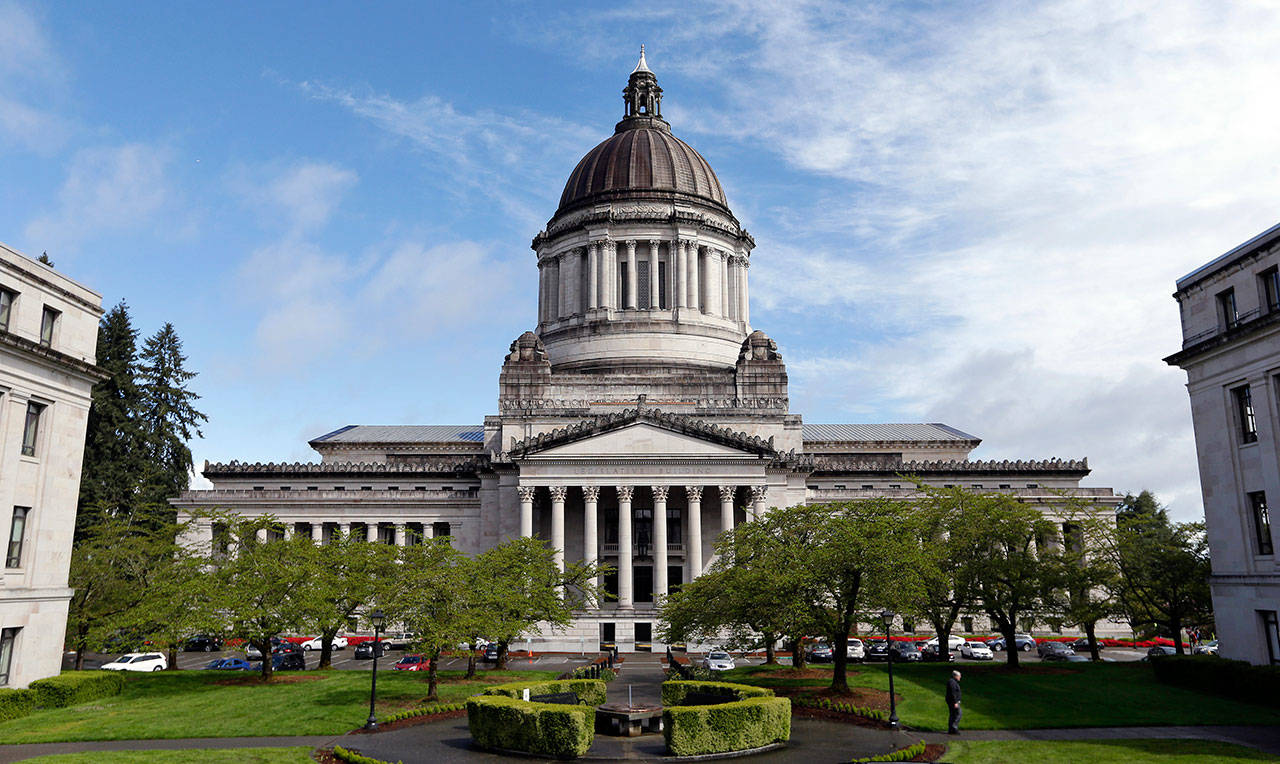By Rachel La Corte
The Associated Press
OLYMPIA — Washington lawmakers closed out their third week of special session and so far have little to show for it.
While there have been some House and Senate floor votes to re-pass bills that were previously approved by individual chambers in the regular session, and a few committee hearings, for the most part, the Capitol is empty except for budget negotiators and a handful of other lawmakers who are meeting regularly as part of an education funding task force.
Session ends this month
Here’s a look at what is — and isn’t — happening as lawmakers close in on the end of the 30-day special session that is scheduled to end May 23:
• BUDGET NEGOTIATIONS: Broad negotiations between Senate majority Republicans and House majority Democrats are not happening on the overall multi-billion dollar two-year state operating budget. However, conversations between key negotiators have been taking place.
Funding issue
Both chambers passed their own plans during the regular session that ended in April — with the House budget at $44.6 billion and the Senate plan at $43 billion — but Senate Republicans have said because House Democrats have not passed the taxes that pay for their plan, it’s impossible to negotiate.
House Democrats say they’re ready to negotiate, but have no plans to take those floor votes because they want to have an agreed-upon compromise plan in place first.
• EDUCATION FUNDING: A bipartisan group of lawmakers — which includes some of the main budget writers — has been meeting several times a week to address the largest portion of their budget woes: how to finally fully comply with a 2012 state Supreme Court ruling on education funding that has left the state in contempt of court for nearly two years.
The court has said that the state has until Sept. 1, 2018, to do that, but that the details including funding must be in place before the Legislature adjourns this year.
The group that has been meeting has focused on policy, and not funding, at this point, according to the lawmakers involved.
• MAIN STICKING POINT: Among the differences between the budget proposals put forth by both chambers is how they address the local property tax levies.
Public school districts currently pay a big chunk of teacher salaries with those levies, and the biggest piece remaining of the court order is figuring out how much the state must provide for the salaries.
Unlike the Senate plan, which would replace local school levies with a statewide uniform property tax rate earmarked for schools, the House plan would lower the local levy rate, but not eliminate the local levies completely.
The two-year plan put forth by the House also seeks about $3 billion in taxes that the full chamber has not voted on, including a new capital gains tax. The Senate plan would make cuts to some state programs.
• WHAT ELSE IS HAPPENING: Not much. Most of the Legislature’s 147 members are back in their home districts and both the House and Senate just have “pro forma” sessions scheduled through next week, which means that someone just has to gavel in a few times a week as a technicality.
Regular weekly news conferences with legislative leadership have also waned.
The main action has been Gov. Jay Inslee signing nearly 300 bills into law that were passed during the 105-day regular session. He will sign the remainder of regular session bills Tuesday.
• WHAT’S IT COSTING: On top of their salaries, lawmakers can claim an additional daily per diem of $120 a day during regular and special sessions, even on weekends.
Records from the first two weeks of the overtime session show that the House, which has 98 members, has paid out more than $44,000 in per diem, and the Senate, with 49 members, has paid out nearly $32,000 in per diems so far.
While most lawmakers just put in for specific days they worked, eight senators claimed the entire $840 a week, even for days they weren’t on campus: Republican Sens. Barbara Bailey, Michael Baumgartner, Doug Ericksen, Phil Fortunato, Brad Hawkins, Maureen Walsh, and Democratic Sens. Maralyn Chase and Bob Hasegawa.
In the House, just five members claimed their full per diem: Democratic House budget writer Timm Ormsby, Democratic Reps. Lillian Ortiz-Self, Eric Pettigrew and June Robinson, and Republican Rep. Drew Stokesbary.
Just eight senators didn’t claim any per diem at all, even those who are regularly at the Capitol: Republican Sens. Joe Fain, John Braun, Dino Rossi, and Hans Zeiger, and Democratic Sens. Annette Cleveland, David Frockt, Sam Hunt and Mark Mullet.
In the House, 15 opted to not take a special session per diem: Democratic House Speaker Frank Chopp, Democratic Reps. Laurie Dolan, Mia Gregerson, Christine Kilduff, John Lovick, Tina Orwall, Mike Pellicciotti, Kristine Reeves, Vandana Slatter, and Republican Reps. Paul Graves, Dan Griffey, Mark Hargrove, Terry Nealey, Jim Walsh and J.T. Wilcox.
• ANOTHER SPECIAL SESSION? If lawmakers haven’t reached a budget deal and passed it by the time the first special session ends May 23, the governor will likely call them back right away for another 30-day special session.
The current two-year budget expires June 30, which means the 2017-2019 budget must be signed by the governor by then or else the state is at risk of a partial government shutdown.
